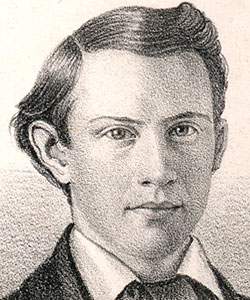Joseph Payson Wright (Dickinson Chronicles)
Scholarship
Joseph P. Wright was born in Wilkes Barre, Pennsylvania on December 25, 1836. He entered Dickinson College in Carlisle, Pennsylvania, where he was elected to the Union Philosophical Society and graduated with the class of 1858 in July of that year. Wright then moved on to study medicine at Jefferson Medical College in Philadelphia.
When the Civil War broke out, Wright enlisted in May 1861 as an assistant surgeon with the rank of first lieutenant. He served with the regular army's Fourth Artillery in Ohio during the remainder of that year. Wright then became medical purveyor for the Department of the Ohio on the staffs of Generals McClellan and Rosencrans. In July 1862, he moved to General Grant's headquarters with the Army of Tennessee, acting as chief of the medical purveyor's department until June 1863. At that time, he became the officer in charge of the army's general hospital in Memphis. Wright was then named assistant medical director for the Army of the Cumberland in March 1864. He served in that capacity until the surrender, when Wright resumed his post as head of the Memphis hospital, a position he held until February 1866.
By this time, Wright had risen to acting lieutenant colonel and had decided on a military career. He received a regular commission as captain and assistant surgeon in May 1866 and was promoted to major and surgeon two months later. Wright's later career echoed the tasks of the army for the next two decades. He was stationed at Boston Harbor for three years. Wright then spent the next five years in the Dakota Territory, where he was chief medical officer on the Yellowstone and Powder River Expedition in Montana in the summer of 1872. He also spent one year as the chief medical officer of the New Mexico Territory, and he was post surgeon for Fort Leavenworth and its United States Military Prison for seven years.
No records have been found to indicate that Wright ever married. Joseph Payson Wright died on October 8, 1900. He was fifty-three years old.
When the Civil War broke out, Wright enlisted in May 1861 as an assistant surgeon with the rank of first lieutenant. He served with the regular army's Fourth Artillery in Ohio during the remainder of that year. Wright then became medical purveyor for the Department of the Ohio on the staffs of Generals McClellan and Rosencrans. In July 1862, he moved to General Grant's headquarters with the Army of Tennessee, acting as chief of the medical purveyor's department until June 1863. At that time, he became the officer in charge of the army's general hospital in Memphis. Wright was then named assistant medical director for the Army of the Cumberland in March 1864. He served in that capacity until the surrender, when Wright resumed his post as head of the Memphis hospital, a position he held until February 1866.
By this time, Wright had risen to acting lieutenant colonel and had decided on a military career. He received a regular commission as captain and assistant surgeon in May 1866 and was promoted to major and surgeon two months later. Wright's later career echoed the tasks of the army for the next two decades. He was stationed at Boston Harbor for three years. Wright then spent the next five years in the Dakota Territory, where he was chief medical officer on the Yellowstone and Powder River Expedition in Montana in the summer of 1872. He also spent one year as the chief medical officer of the New Mexico Territory, and he was post surgeon for Fort Leavenworth and its United States Military Prison for seven years.
No records have been found to indicate that Wright ever married. Joseph Payson Wright died on October 8, 1900. He was fifty-three years old.
John Osborne and James W. Gerencser, eds., “Joseph Payson Wright,” Dickinson Chronicles, http://chronicles.dickinson.edu/encyclo/w/ed_wrightJP.htm.



